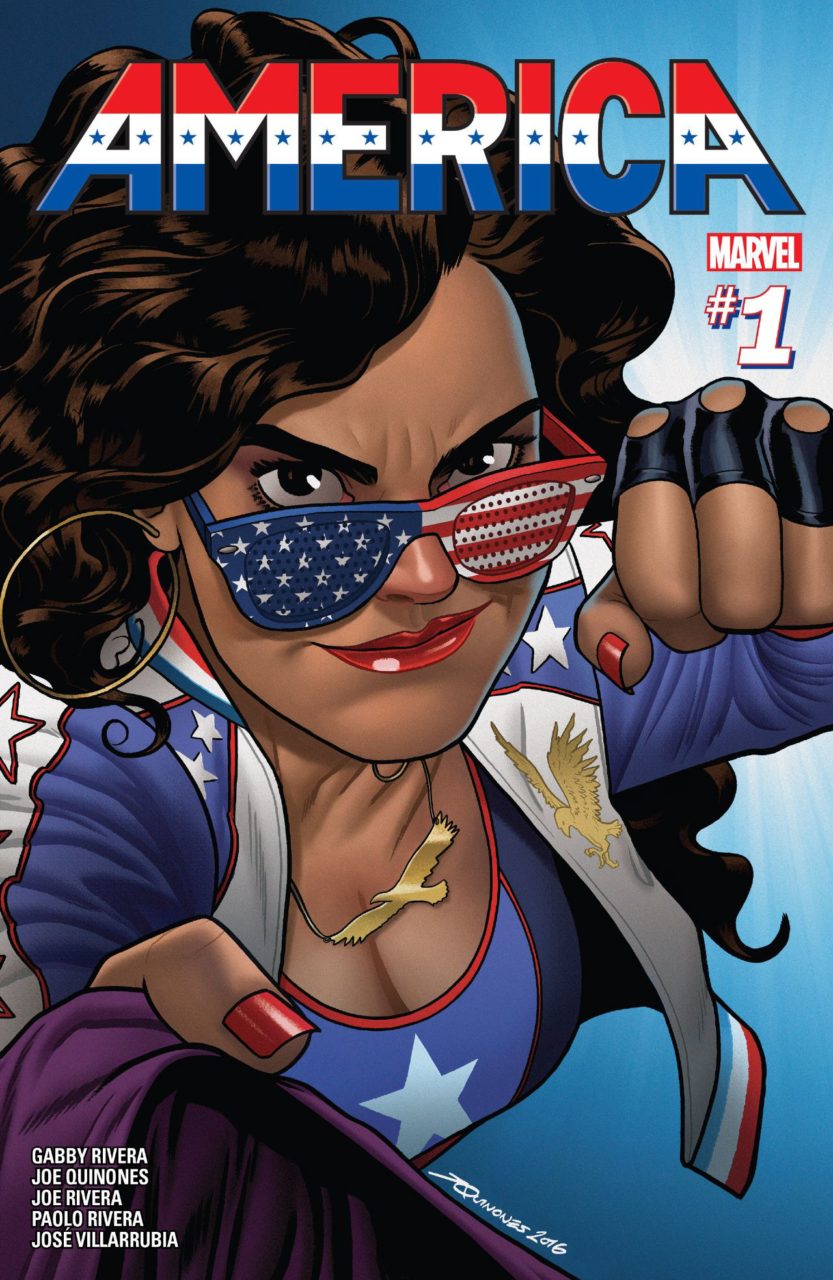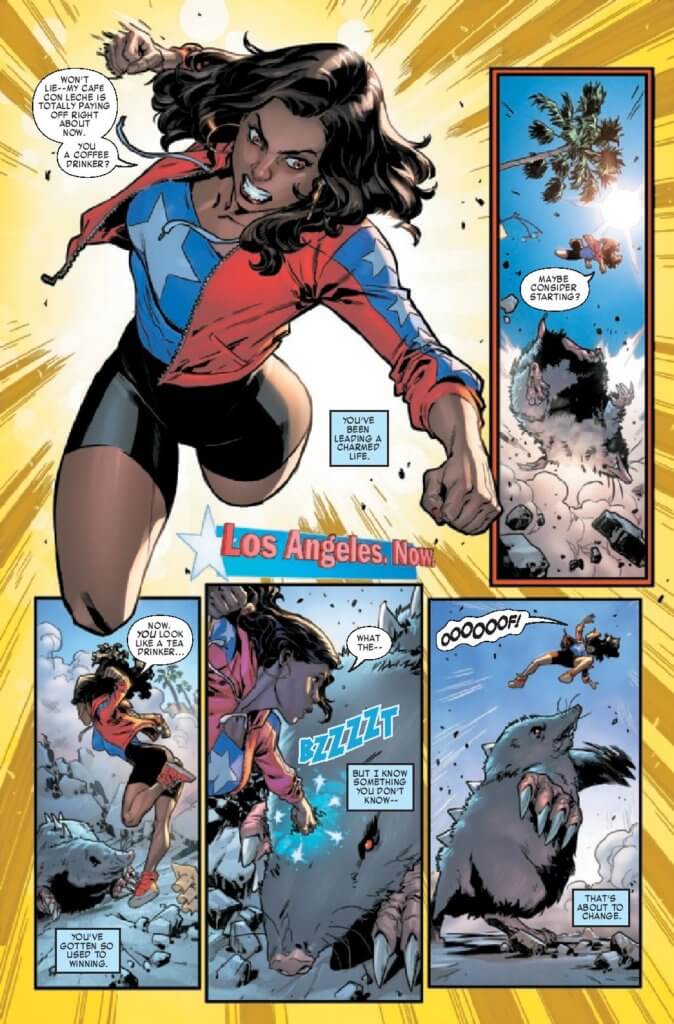America Chavez is a lot of things: queer, Latina, a great puncher, a good friend, a caring partner. She’s been hailed as good representation and criticized for being bad reputation, been lauded as progressive and torn down as stereotypical. Basically, despite being a relatively young character — she was created by Joe Casey and Nick Dragotta for their 2011 miniseries Vengeance — she’s got a multiverse of baggage that any new creative team has to unpack.
America Chavez: Made in the USA #1
Kalinda Vazquez (writer), Carlos Gómez (artist), Jesus Aburtov (colorist) VC’s Travis Lanham (letterer)
Marvel
March 3, 2021
America Chavez debuted in tight pants and a bustier, but her breakout look was the brainchild of artist Jamie McKelvie for his run of Young Avengers with Kieron Gillen in 2013. McKelvie gave her the iconic star-spangled streetwear look that has become a cosplay staple (at least for me), and the series net America a bunch of new fans. After that wrapped, she popped up in Ultimates (Al Ewing and Kenneth Rocafort, et al), and then her solo series launched in 2017. YA novelist Gabby Rivera wrote twelve issues, joined on covers and interiors by Joe Quinones and other artists, including Ramon Villabos, Jen Bartel, F Flaviano, and Stacey Lee. The Latine-heavy creative team was refreshing for a character that had, up until then, been written and drawn primarily by Anglo men. That didn’t stop a wave of #ComicsGate-led harassment from hitting Rivera, who was attacked for her identity and her writing.
While I know that matching identities with a character doesn’t guarantee a great comic, having a queer Latina write a series about a queer Latina? Felt great for me, a queer Latina who was already incredibly invested in this character, and it’s a run I’ve recommended a bunch. Alas, that series was cancelled and wrapped in February 2018. That same year, America joined the new team/old title West Coast Avengers (Kelly Thompson and Stefano Caselli, et al), where she got a new superpowered girlfriend Ramone (who also appears in this title!), and where she was last seen.
Now that we’re all caught up, let me start with the cover by Sara Pichelli and Tamra Bonvillain. It’s very cute and well-rendered, but suggests a less buff and less curvy — and possibly younger — America than we’ve come to know. I’m a fan of both of these artists but this cover does not give America the presence or the style that she had in her previous solo outing, with Joe Quinones on covers. This America is not an embodiment of “thick thighs save lives” and while it might not seem like a huge deal, the cover did not fill me with excitement when this series was announced, despite it having a Latina writer attached — Kalinda Vazquez. (Colorist Jesus Aburtov is also Latino, while Carlos Gómez is Spanish).
Vazquez is another writer hired from outside the comics world, primarily working as a screenwriter and producer for television. She’s worked on Prison Break, Nikita, Once Upon a Time, and more recently, Runaways and Star Trek: Discovery. But unlike some of Marvel’s other hires, America Chavez: Made in the USA isn’t her first comic either — she was involved in two television spin-off books, the Jericho: Season 4 comic continuation and a Once Upon a Time comic. As for the artist, Gómez is well-versed in female-led titles, having worked on Marvel titles such as Amazing Mary Jane and Gwen Stacy.
Okay okay, enough with the background — how is the book? Honestly, that’s a complicated answer for me. It’s hard for me to read this book as anything but a response to a repeated critique of America Chavez — how can she be “good representation” of a Latina if she’s not actually from a Latin American country and has no roots on Earth? The subtitle to the series explicitly points it out: America Chavez wasn’t made in the USA, though she’s certainly product of America and its culture. But personally? I’ve never had a problem with her Utopian Parallel origin — in a universe where there are other dimensions and aliens, why wouldn’t some be Latine?
As a 1st/2nd gen Latina who often feels like I have a tenuous connection with mi familia’s culture of origin, (despite growing up with a household of Peruvians), America’s rootlessness combined with her full-throttle embrace of identity was a feature, not a bug. I don’t expect this to be a particularly popular way to relate to her as a character, and that’s fine, but I did want to summarize some of the baggage I’m coming to this character with and how I relate to her.
Storywise, Vazquez does a lot in a single issue to establish a backstory we’ve only seen hints of, America’s time as a child after arriving on Earth. The previous series showed her well-integrated in a neighborhood and now we know that ‘hood is Washington Heights. We see America being rescued by the Santana family on the beach — a kindly father decides that she’ll be by them, whether she be undocumented or not. The Afro-Latine Santana family owns a bodega and live above it, and seem incredibly loving, telling their son to be kind and gentle with the young girl.
The scenes with the Santanas are soft, but it’s jarring to learn about them as a reader familiar with America’s earlier stories; the Rivera run focused tightly on her longing for her mothers and her home, and exploring that deep desire for familial connection. To discover that there’s a family we’ve never heard her refer to, that raised her to an extent, but that she’s out of touch with feels deliberately out of character, like Vazquez is starting off with America’s darkest secret.
The story is quite compelling, and fills in a part of America’s past that’s always been ill-defined — what was she doing before she joined up with the Teen Brigade? I appreciate that Vazquez is building on the same themes of familial alienation, desire to for a coherent identity and familial past, and found families that Rivera and Thompson have laid out previously.
Art-wise, the book is best when the action is frenzied. When America throws a punch, it looks like it has heft behind it. When there’s less punching happening, Gomez’ America seems less muscled and more sexy, thigh gap and all. Jesus Aburtov’s colors are bold, which befits America, but combined with heavy inking and bright light sources, everyone looks shiny. There’s a lot happening in the gutters of this comic as well — flashback pages have blue backgrounds instead of white, and at least one page has a gradient from blue to white as the panels flip from the past to the present. While I like the idea in theory, the blue is too strong. Everything looks busy, which is great when we’re watching America and Kate Bishop fight off some monsters, but works less well for quieter moments. I do appreciate the expressiveness Gomez brings to his characters faces — while a young America is mostly wordless, you know exactly how she’s feeling.
The cover for #2 has America draped in the Puerto Rican flag, so it seems like her nationality — adopted or not — is going to finally be definitive, and maybe that will make the discomfort some feel with her place in the pantheon of “diverse” and “representative” heroes ease up. She’s been read as Puerto Rican and Rivera certainly leaned into that as a Nuyorican herself — but does an adopted family give America an adopted nationality, and does it matter? I know there are readers who have been grappling with these questions, and I want to say I think it’s totally valid to feel disconnected from a character that is pushed as “representation” for any reason at all. It’s smart for Vazquez to face these questions head-on. But as a reader I have to say I’m less concerned with the goodness of representation than I was even a few scant years ago so I’m ambivalent about this story as a response to critique. I’m more interested in stories that allow marginalized characters to be flawed and tell interesting, knotty stories rather than striving for some kind of checklist of representation.
So, what am I saying? I’m not really bothered with whether or not Vazquez’ America Chavez is somehow better or worse representation than any other iteration of America. But I am interested in how she’ll navigate the mysteries of America’s past in this series, and she’s definitely got me hooked. Here’s to hoping my girl gets some fly outfits next issue.




